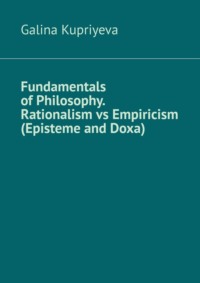Czytaj książkę: «Fundamentals of Philosophy. Rationalism vs Empiricism (Episteme and Doxa)»
© Galina Kupriyeva, 2024
ISBN 978-5-0064-8262-3
Created with Ridero smart publishing system
FUNDAMENTALS OF PHILOSOPHY.
RATIONALISM VS EMPIRICISM (EPISTEME AND DOXA).
INTRODUCTION
Since 500 BC there were few different philosophical schools, which we can call late philosophers, such as pythagoreans, atomists, sophists. They constructed their theories basing on previous philosophical views and had earlier philosophers as their teachers. Afterward, Socrates followed them in his writings and preceded Plato who was his most famous student. So, Plato was the pupil of Socrates and when Socrates died, Plato, based on Socrates teachings wrote dialogues between Socrates and others, consisting of discussion – questioning and answering. Meanwhile, Plato founded his own school, Academy, in 385. Plato, through his Socrates’ dialogues, had proposed division of human beings founding on their courage, strength and intelligence. In the late 300 BC there were two opposite points of view among philosophers. The first were idealists who believed in transcendental matter of mind and the second were materialists who considered that materials are the premises for ideas and thoughts. Afterwards, these two trends were developed and grew into Rationalism and Empiricism. Contemporary analysts consider Plato as the first rationalist and Aristotle as the first empiricist. Aristotle and Plato agreed on the point that there is highest level of knowledge, however they were at variance with the interpretation of this. Plato asserted that the true nature and, hence, knowledge of the world is beyond what we experience through human senses, yet Aristotle retained that our knowledge of the world must be formally rooted in empirical reality.1 Aristotle’s school, the Lyceum dealt with empirical research. The main contradiction between rationalists and empiricists is how we gain knowledge. They are conflicting on this issue and their responses on it are absolutely different. Rationalists’ thinkers deem that our knowledge itself is innate and stay with us eternally while empiricists claim that our true knowledge comes to us with experience.
WHAT IS REAL? WHAT IS TRUE?
Intellectual transition in philosophical thought from supernatural to natural perception of the world is an attempt to find reasons through knowledge and observation. Thales of Miletas (600 BC) challenged to material monism and Mythopoeic Era left behind. Theoretical aspect about single stuff, which is an essence for universe, lay in the ground of materialism monism. Such stuff for Thales was water from which springs everything, for Anaximander followed him it was infinite or «boundless», for Anaximenes it was air. If, for example, we imagine ourselves as a modern material monists, then our possible answer to the question «What is real» would be – an Energy.
Darmowy fragment się skończył.
